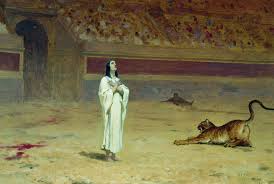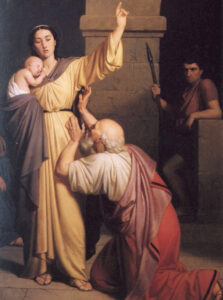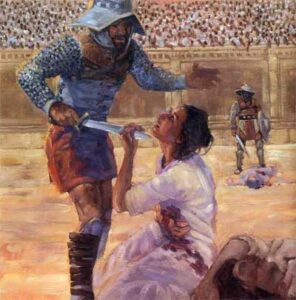
St. Perpetua was an early martyr under Roman persecution, who is still remembered to our day. She was born Vivia Perpetua at Carthage about 181 A.D. The ancient city of Carthage was a large one and a prominent part of the Roman Empire, and it was located in North Africa in the modern nation of Tunisia. It was an important center of early Christianity, and remained so until it was destroyed by the Muslims in 698. Perpetua came from a patrician family, her father being a pagan and her mother a Christian. Nothing is known of her early life, but she did have at least one brother.
DEADLY DECREE
During the persecution of Christians under the Roman Emperor Severus, Perpetua was a catechumen. When an imperial decree was sent out forbidding anyone from becoming Christian, Perpetua refused her father’s insistence that she renounce her Christian faith. She was arrested in the year 203 along with four companions, Saturninus, Secundulus, and the slaves Felicitas and Revocatus. At the time of the arrest, Perpetua was married and had an infant son still young enough to be nursing, and Felicitas was eight months pregnant. The prisoners were taken to a private home, and were baptized there by Saturus, who had been their teacher in the faith, and who had since joined them in imprisonment. Most of what we know of these events comes to us from the first hand account of Perpetua herself, as well as that of Saturus.

During this imprisonment, Perpetua’s father continued to plead with her to deny her faith, which greatly grieved her because of his disbelief, and she refused. Shortly afterward, the group of prisoners was transferred to a prison, where Secundulus died. Perpetua wrote very compellingly about the little group in prison: the uncomfortable heat, the harsh treatment at the hands of the guards, her own grief about her father’s soul, Felicitas’ anxiety that her pregnant state would prevent her martyrdom, and the groups desire, even joy, to give themselves over completely as martyrs for Christ. They well knew the danger they were in, and they faced it with astonishing courage and determination. During the imprisonment, Felicitas gave birth and Perpetua was allowed to nurse her own son. Both babies were given to Christian women and family members to raise, which gave both young mothers great peace about their children’s futures. Perpetua also writes descriptively about visions she experienced while imprisoned, which reinforced her faith in God Who awaited her, and of His victory over death.
When the time came for their trial, the prisoners were questioned at the forum by the provincial procurator, Hilarion, where once again, Perpetua’s father appeared, carrying her baby son, and begging her to disavow her belief in Christ. She stood firm, as did her companions, and her father had to be forcibly removed. The prisoners were promptly ordered to be immediately beaten and were sentenced to be fed to the wild beasts at the upcoming public games. At this point, Perpetua’s writings cease, and it is another eyewitness, unknown and unnamed, who tells us the remainder of the events.
MARTYRDOM WITH JOY
The day before the games were to be held, the prisoners were given a customary last meal, which they made into an “agape feast”, where many gathered around them to hear them proclaim God’s greatness and their own joy at their impending deaths. This event so astounded their witnesses, that many conversions from paganism occurred that day. On March 7, 203, the prisoners were taken to the arena, where they proceeded in cheerfulness, Perpetua doing so in song. They were scourged, and then the men and women were separated to opposite ends of the arena. Each was attacked by a wild angry animal, Perpetua by a cow, which had merely thrown her about, but which had seriously wounded Felicitas. Perpetua gave Felicitas assistance to stand up, the two women gave each other the kiss of peace, and were then turned over to the gladiators to be beheaded. Perpetua’s executioner had an unsteady hand and she actually guided it to the place on her neck for the act of beheading, one last testament to her courage and resolve. She was 22 years old.

The written testimony of St. Perpetua is a treasure for the Church, first, because it was one of the earliest known writings by a woman believer, and second, because it is a reliable account in the martyr’s very own words. The courageous witness given by Sts. Perpetua and Felicitas (Felicity in English) is still recalled each time Eucharistic Prayer I is offered at Mass, when their names are included with those of the Apostles and great martyrs and fathers of the early Church. Perpetua and Felicity share a feast day, March 7. They are patrons of martyrs.
